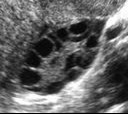PCOS - Polycystic Ovary Syndrome
WHAT IS PCOS ?
WHAT CAUSES PCOS
ARE THERE ANY LONG-TERM RISKS ASSOCIATED WITH PCOS?
DIAGNOSIS and TREATMENT
The current diagnosis of PCOS is one of exclusion of other androgenic-based diseases following clinical identification of at least two of the following three criteria: chronic oligo-/anovulation (infrequent menstrual periods); clinical and/or biochemical signs of hyperandrogenism (excessive body hair and acne) and ultrasound evidence of polycystic ovaries.
In day to day clinical practice weight loss and weight maintenance are central to the care of women with PCOS. This usually involves a combination of lifestyle advice on diet and exercise provided by a healthcare professional (Dietician, Nurse or Doctor), the use of anti-obesity drugs and in extreme cases anti-obesity surgery. However, although some women with PCOS will successfully lose weight, weight maintenance is a real challenge in women with obesity with most women putting back the weight within a few years of losing the weight.
Infertility is best managed by a recognised PCOS specialist and the options include Clomiphene, Metformin, Gonadotrophins, Laparoscopic Ovarian Drilling or assisted conception.
Menstrual disorders can be managed using the combined oral contraceptive, cyclical progestogens or the Mirena Intrauterine System.
Hirsutism may be managed using mechanical methods (shaving, laser treatment, depilatory creams e.t.c), the combined oral contraceptive, cyproterone acetate, spironolactone, finansteride or flutamide.
Women have to be monitored for potential long term complications such as diabetes and womb cancer and advised to maintain a healthy lifestyle and avoid weight gain to prevent the risks of these occuring.
